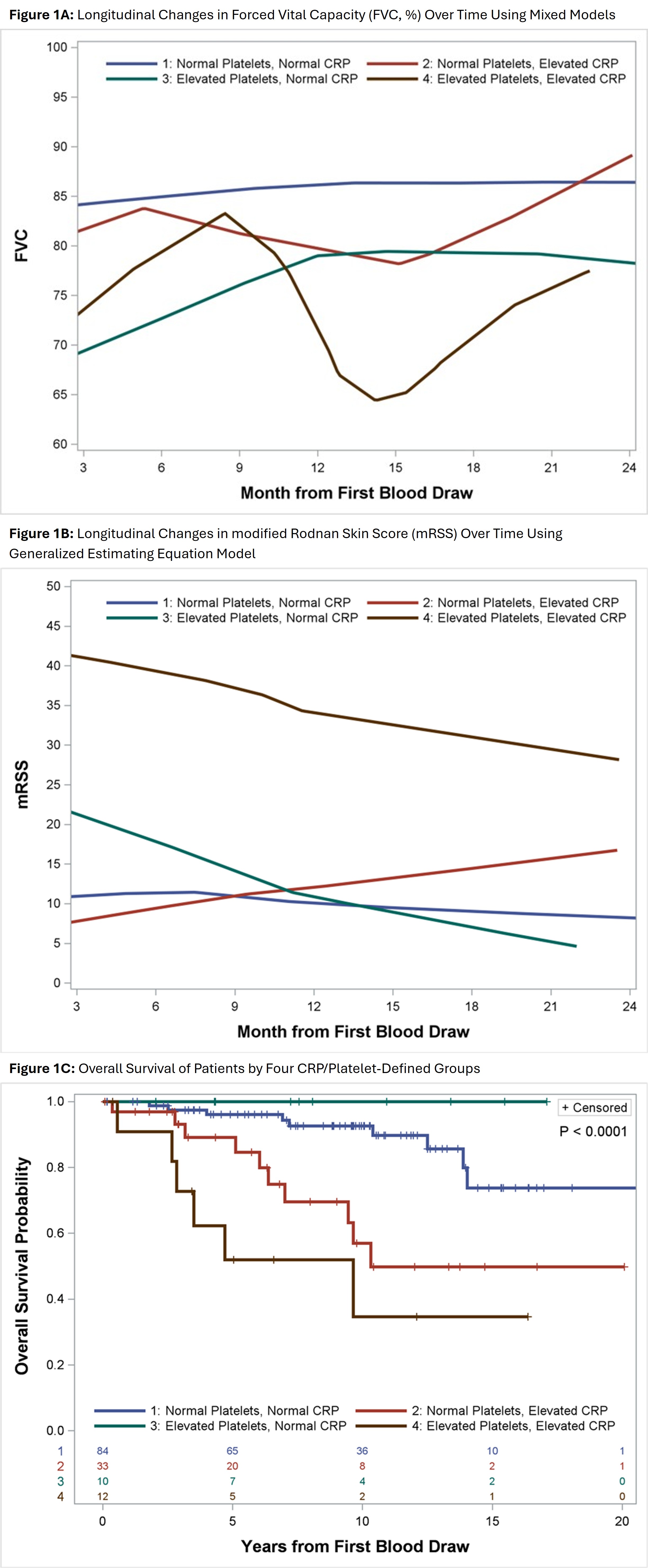Session Information
Date: Sunday, October 26, 2025
Title: (0671–0710) Systemic Sclerosis & Related Disorders – Clinical Poster I
Session Type: Poster Session A
Session Time: 10:30AM-12:30PM
Background/Purpose: Elevated acute phase reactants such as platelets and C-reactive protein (CRP) have been used as inclusion criteria to enrich systemic sclerosis (SSc) clinical trials for patients with active disease. While elevated CRP levels have been associated with severe disease and worse survival, the role of platelet levels remains largely unexplored.
Methods: We performed a retrospective study of adult SSc patients seen at a single tertiary care center from 1996 to 2022. Based on the first available blood draw after onset of first non-Raynaud symptom, patients were categorized into four groups using cutoffs of ≥330,000/µL for elevated platelet and ≥6.0mg/L for elevated CRP: 1) normal platelet/normal CRP (NP/NC), 2) elevated platelet/normal CRP (EP/NC), 3) normal platelet/elevated CRP (NP/EC), 4) elevated platelet/elevated CRP (EP/EC). Longitudinal forced vital capacity (FVC) and modified Rodnan skin score (mRSS) were captured over two years following the initial blood draw. Survival data were collected until end of study (12/31/2024), death, or the last available clinic date. Fisher’s exact test, Kruskal-Wallis Tests, mixed model, generalized estimating equation model, log-rank test of Kaplan-Meier, and Cox regression analyses were used, with p< 0.05 considered statistically significant.
Results: There was a total of 139 patients in the study, with 84, 33, 10, and 12 patients in the NP/NC, NP/EC, EP/NC, and EP/EC groups, respectively. The EP/EC group had the highest percentage of patients with Scl-70 positive antibody, diffuse skin involvement, myocarditis/cardiomyopathy, dysphagia, gastric antral vascular ectasia (GAVE), joint contracture, and digital ulcers compared to other groups (p< 0.05 for all) (Table 1). The EP/EC group had significantly higher use of methotrexate and antifibrotic agents compared to other groups (p< 0.05 for all). Over two years, the NP/NC group had the highest FVC baseline values and remained the most stable. In contrast, both elevated CRP groups (NP/EC and EP/EC) had a decline in FVC values during the first year followed by some improvement, with EP/EC group having the steepest drop during the first year. However, there were no statistically significant differences between the groups over time (Figure 1A). Over the same period, EP/EC group had the worst mRSS scores, which improved over time but remained significantly higher than the other three groups (p< 0.05 for all comparisons with the EP/EC group) (Figure 1B). Survival was lowest in the EP/EC group, with a median survival of 9.6 years compared to 21.3 years in the NP/NC group (p< 0.0001) (Figure 1C) and a hazard ratio (HR) of 8.04 (2.84-22.79, p< 0.0001) (Table 2). When comparing the EP/EC group to the NP/EC group, the HR was 2.04 (0.74-5.64, p=0.17) (Table 2).
Conclusion: SSc patients with elevated platelets and CRP developed more severe disease than the other groups. This subset had an eightfold increased risk of mortality compared to those with normal platelets and CRP. The combination of elevated platelets and CRP may have a greater impact on survival than CRP alone. Assessing CRP and platelet levels after symptom onset may help identify high-risk patients and guide clinical care.
To cite this abstract in AMA style:
Lee B, Li S, Davuluri S, Lee J, Chung L. Association of Elevated Platelets and CRP With Severe Disease and Poor Survival in Systemic Sclerosis [abstract]. Arthritis Rheumatol. 2025; 77 (suppl 9). https://acrabstracts.org/abstract/association-of-elevated-platelets-and-crp-with-severe-disease-and-poor-survival-in-systemic-sclerosis/. Accessed .« Back to ACR Convergence 2025
ACR Meeting Abstracts - https://acrabstracts.org/abstract/association-of-elevated-platelets-and-crp-with-severe-disease-and-poor-survival-in-systemic-sclerosis/


.jpg)
.jpg)